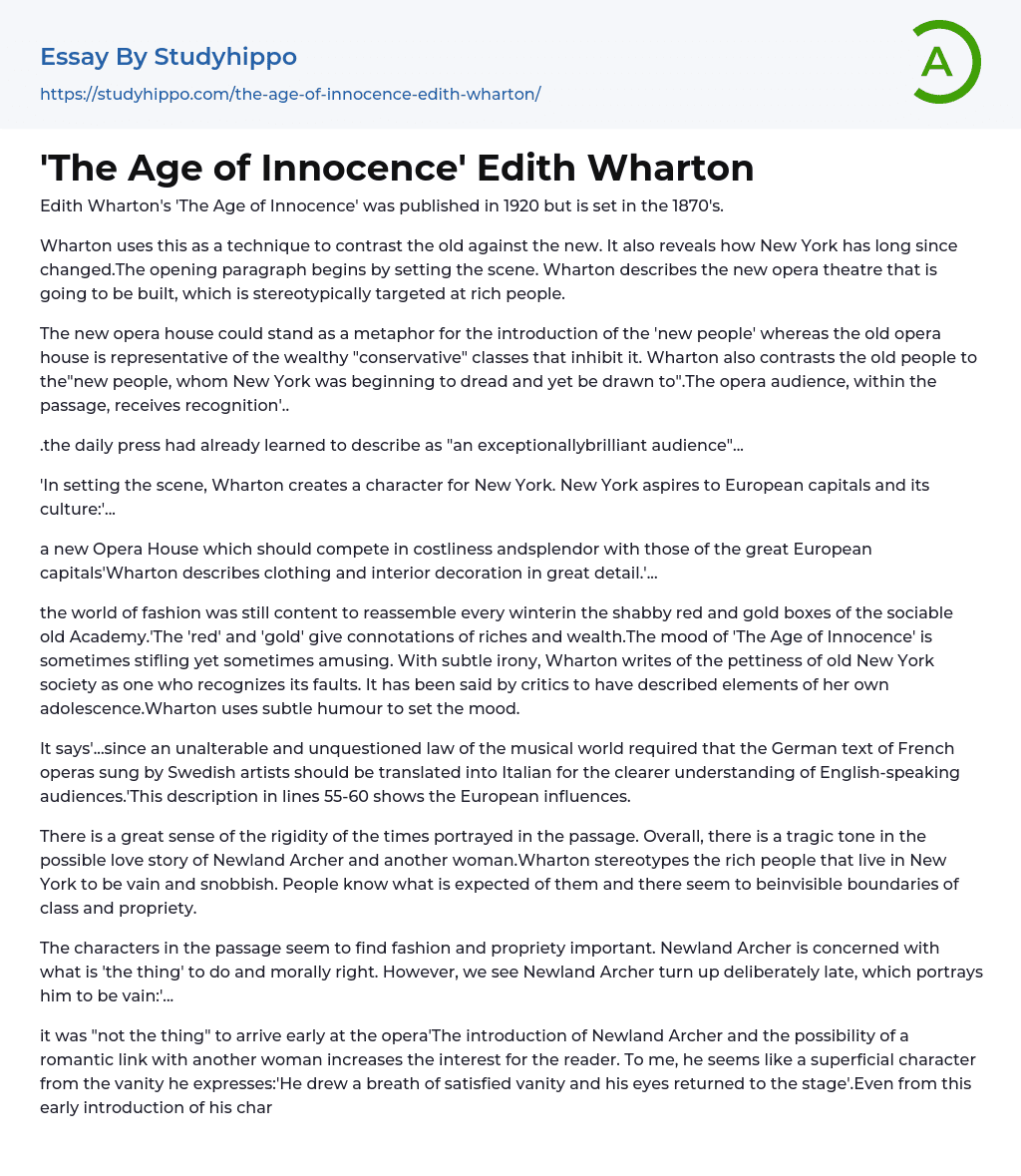Edith Wharton's 'The Age of Innocence' was published in 1920 but is set in the 1870's.
Wharton uses this as a technique to contrast the old against the new. It also reveals how New York has long since changed.The opening paragraph begins by setting the scene. Wharton describes the new opera theatre that is going to be built, which is stereotypically targeted at rich people.
The new opera house could stand as a metaphor for the introduction of the 'new people' whereas the old opera house is representative of the wealthy "conservative" classes that inhibit it. Wharton also contrasts the old people to the"new people, whom New York was beginning to dread and yet be drawn to".The opera audience, within the passage, receives recognition'..
.the daily press had already learned to describe as "an exceptionallybrilliant audience"...
'In setting the scene, Wha
...rton creates a character for New York. New York aspires to European capitals and its culture:'...
a new Opera House which should compete in costliness andsplendor with those of the great European capitals'Wharton describes clothing and interior decoration in great detail.'...
the world of fashion was still content to reassemble every winterin the shabby red and gold boxes of the sociable old Academy.'The 'red' and 'gold' give connotations of riches and wealth.The mood of 'The Age of Innocence' is sometimes stifling yet sometimes amusing. With subtle irony, Wharton writes of the pettiness of old New York society as one who recognizes its faults. It has been said by critics to have described elements of her own adolescence.Wharton uses subtle humour to set the mood.
It says'...since an unalterable and unquestioned law of the musical world required that the Germa
text of French operas sung by Swedish artists should be translated into Italian for the clearer understanding of English-speaking audiences.'This description in lines 55-60 shows the European influences.
There is a great sense of the rigidity of the times portrayed in the passage. Overall, there is a tragic tone in the possible love story of Newland Archer and another woman.Wharton stereotypes the rich people that live in New York to be vain and snobbish. People know what is expected of them and there seem to beinvisible boundaries of class and propriety.
The characters in the passage seem to find fashion and propriety important. Newland Archer is concerned with what is 'the thing' to do and morally right. However, we see Newland Archer turn up deliberately late, which portrays him to be vain:'...
it was "not the thing" to arrive early at the opera'The introduction of Newland Archer and the possibility of a romantic link with another woman increases the interest for the reader. To me, he seems like a superficial character from the vanity he expresses:'He drew a breath of satisfied vanity and his eyes returned to the stage'.Even from this early introduction of his character, the reader becomes interested to read on. There is a sense that something is going to happen with a possible love interest of Newland Archer, therefore we, as the reader, are curious to find out.
- Boo Radley essays
- Genesis essays
- Richard iii essays
- Alice in Wonderland essays
- On the road essays
- Ozymandias essays
- The Nightingale essays
- Holden Caulfield essays
- Animal Farm essays
- 1984 essays
- A Hanging essays
- Shooting An Elephant essays
- A Tale Of Two Cities essays
- Adventures Of Huckleberry Finn essays
- Arthur Conan Doyle essays
- Brave New World essays
- Characters In Hamlet essays
- Characters In Romeo And Juliet essays
- Desdemona essays
- Diary Of A Wimpy Kid essays
- First-Person Narrative essays
- Frankenstein essays
- Heart Of Darkness essays
- Jane Eyre essays
- Jay Gatsby essays
- King Duncan essays
- Librarian essays
- Little Red Riding Hood essays
- Lord Of The Flies essays
- Silas Marner essays
- The Cask Of Amontillado essays
- The Catcher In The Rye essays
- The Crucible essays
- The Handmaid's Tale essays
- The Reader essays
- Virgil essays
- Wuthering Heights essays
- Candide essays
- Castle essays
- J. D. Salinger essays
- Ulysses essays
- Ethan Frome essays
- In Cold Blood essays
- Outliers essays
- Tuesdays With Morrie essays
- The Art of War essays
- Wife of Bath essays
- Huckleberry Finn essays
- The Lady With The Dog essays
- Great Expectations essays




